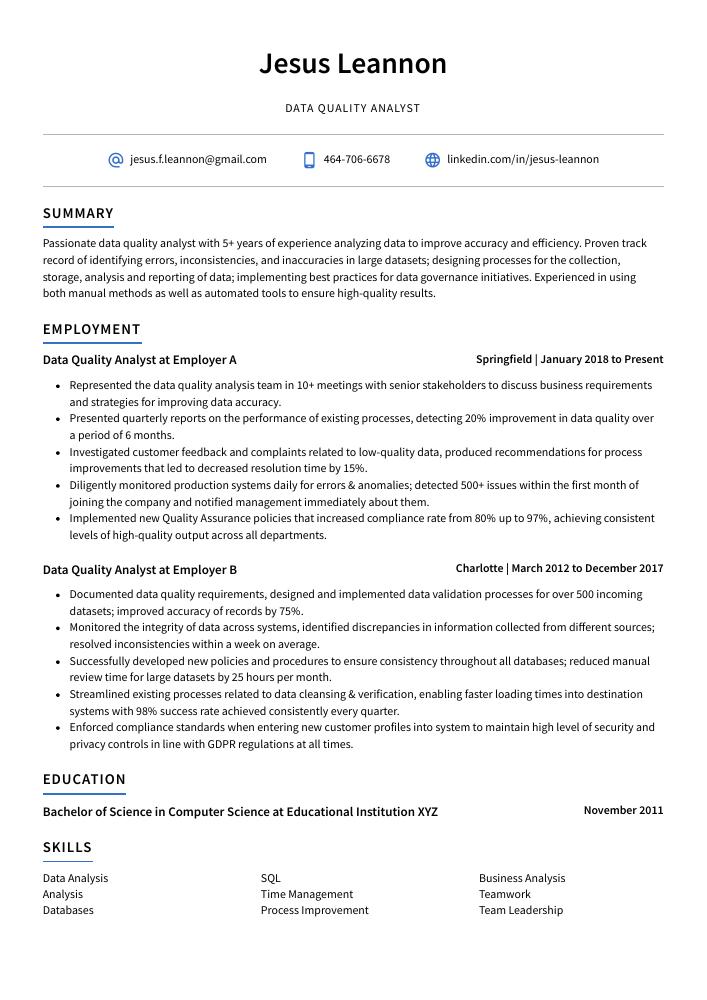Data Quality Analyst Resume Guide
Data Quality Analysts are responsible for ensuring the accuracy, completeness and consistency of data used in an organization. They analyze existing databases and identify errors or discrepancies, develop strategies to improve data quality and monitor changes in source systems to ensure that information is properly maintained. Additionally, they work closely with other departments such as IT operations to implement solutions for improving overall data integrity.
You have the ability to spot errors and discrepancies in data like no one else, but employers don’t know about your expertise. To make yourself stand out from other applicants, you must write a resume that highlights your knowledge of data accuracy.
This guide will walk you through the entire process of creating a top-notch resume. We first show you a complete example and then break down what each resume section should look like.
Table of Contents
The guide is divided into sections for your convenience. You can read it from beginning to end or use the table of contents below to jump to a specific part.
Data Quality Analyst Resume Sample
Jesus Leannon
Data Quality Analyst
[email protected]
464-706-6678
linkedin.com/in/jesus-leannon
Summary
Passionate data quality analyst with 5+ years of experience analyzing data to improve accuracy and efficiency. Proven track record of identifying errors, inconsistencies, and inaccuracies in large datasets; designing processes for the collection, storage, analysis and reporting of data; implementing best practices for data governance initiatives. Experienced in using both manual methods as well as automated tools to ensure high-quality results.
Experience
Data Quality Analyst, Employer A
Springfield, Jan 2018 – Present
- Represented the data quality analysis team in 10+ meetings with senior stakeholders to discuss business requirements and strategies for improving data accuracy.
- Presented quarterly reports on the performance of existing processes, detecting 20% improvement in data quality over a period of 6 months.
- Investigated customer feedback and complaints related to low-quality data, produced recommendations for process improvements that led to decreased resolution time by 15%.
- Diligently monitored production systems daily for errors & anomalies; detected 500+ issues within the first month of joining the company and notified management immediately about them.
- Implemented new Quality Assurance policies that increased compliance rate from 80% up to 97%, achieving consistent levels of high-quality output across all departments.
Data Quality Analyst, Employer B
Charlotte, Mar 2012 – Dec 2017
- Documented data quality requirements, designed and implemented data validation processes for over 500 incoming datasets; improved accuracy of records by 75%.
- Monitored the integrity of data across systems, identified discrepancies in information collected from different sources; resolved inconsistencies within a week on average.
- Successfully developed new policies and procedures to ensure consistency throughout all databases; reduced manual review time for large datasets by 25 hours per month.
- Streamlined existing processes related to data cleansing & verification, enabling faster loading times into destination systems with 98% success rate achieved consistently every quarter.
- Enforced compliance standards when entering new customer profiles into system to maintain high level of security and privacy controls in line with GDPR regulations at all times.
Skills
- Data Analysis
- SQL
- Business Analysis
- Analysis
- Time Management
- Teamwork
- Databases
- Process Improvement
- Team Leadership
Education
Bachelor of Science in Computer Science
Educational Institution XYZ
Nov 2011
Certifications
Certified Data Quality Analyst
Data Quality Institute
May 2017
1. Summary / Objective
The summary/objective at the top of your resume should be a concise and compelling overview of why you are an ideal candidate for the data quality analyst position. In this section, emphasize key skills such as experience with SQL queries, knowledge of database design principles, and proficiency in data analysis tools. You can also mention any certifications or awards that demonstrate your expertise in this field.
Below are some resume summary examples:
Committed data quality analyst with 5+ years of experience in data analysis, validation, and cleaning. Experienced in creating SQL queries to identify discrepancies between source systems and target databases. Adept at using Tableau & Power BI for dashboards and visualizations. At Company X increased accuracy of customer-facing reports by 24%. Seeking to apply expertise at ABC Corp to ensure accurate reporting across all departments.
Well-rounded data quality analyst with 8+ years of experience in data analysis, mining, and visualization. Highly knowledgeable in various database management systems (DBMS) such as Oracle and SQL Server. Proven track record of improving data accuracy by 30% across an array of projects for a variety of clients. Seeking to join ABC Company to ensure compliance with internal/external regulations through advanced analytics techniques.
Hard-working data quality analyst with 5+ years of experience in data analysis and management. Experienced in creating reports that accurately reflect the underlying data, identifying patterns, trends, and anomalies to ensure accurate decision-making. Recognized for keen attention to detail and a strong commitment to accuracy in all aspects of work. Proven ability to manage multiple tasks at once while meeting tight deadlines.
Seasoned data quality analyst with 8+ years of experience in data governance and management. Proven track record of developing strategies for improving the accuracy, completeness, and reliability of data sets. Experienced in creating metrics to measure process performance and analyzing analytics for trends and insights. Skilled at working with multiple stakeholders to drive successful projects from concept to completion.
Accomplished data quality analyst with 10+ years of experience in data analysis and management. Skilled at using various methods to identify, investigate, analyze and verify the accuracy of data. Experienced with developing processes for monitoring data accuracy throughout its lifecycle from collection to reporting. Comfortable working across teams on multiple projects simultaneously while meeting deadlines consistently.
Proficient data quality analyst with 5+ years of experience auditing, investigating and analyzing data to ensure accuracy. Skilled at developing policies and procedures for managing, collecting, organizing and validating large datasets. Looking to leverage expertise in data analysis techniques with ABC Tech’s mission of delivering high-quality products through innovative technology solutions.
Professional data quality analyst with a track record of successfully executing projects related to data governance, standardization and process optimization. Experienced in analyzing complex datasets for accuracy and identifying areas of improvement within the business processes. Seeking to leverage 5+ years’ experience at ABC Tech to help improve data reliability across all systems.
Detail-oriented data quality analyst with 8+ years of experience in data governance, analysis and reporting. Seeking to join ABC Company to help improve the accuracy, completeness and consistency of their data. At XYZ Inc., identified 3 major gaps in customer information that resulted in a 15% reduction of bad debt write-offs within 6 months.
2. Experience / Employment
The work history/experience section should be written in reverse chronological order, with your most recent job listed first. This is where you provide details on what you did and the results achieved.
Stick to bullet points for this section; doing so makes it easier for the reader to take in all of the information quickly. When writing each point, try to include detail as well as any quantifiable results obtained from your work. For example, instead of saying “Reviewed data accuracy,” you could say, “Conducted detailed review of customer records using SQL queries resulting in a 95% accuracy rate.”
To write effective bullet points, begin with a strong verb or adverb. Industry specific verbs to use are:
- Analyzed
- Monitored
- Evaluated
- Assessed
- Investigated
- Resolved
- Documented
- Implemented
- Optimized
- Reconciled
- Validated
- Enforced
- Reported
- Improved
Other general verbs you can use are:
- Achieved
- Advised
- Compiled
- Coordinated
- Demonstrated
- Developed
- Expedited
- Facilitated
- Formulated
- Introduced
- Mentored
- Participated
- Prepared
- Presented
- Reduced
- Reorganized
- Represented
- Revised
- Spearheaded
- Streamlined
- Structured
- Utilized
Below are some example bullet points:
- Reduced the number of data errors by 50% through the implementation of rigorous quality assurance procedures.
- Validated accuracy and completeness for over 100 databases, ensuring that all records were up-to-date and free from discrepancies.
- Accurately identified potential risks in existing systems & processes with a 95% success rate; implemented corrective measures accordingly to reduce any impact on system operations or performance.
- Reported findings to senior management including detailed recommendations for process improvements; successfully implemented 8 changes which improved overall data accuracy by 25%.
- Demonstrated strong technical proficiency when working with SQL queries and Excel spreadsheets, completing complex tasks within tight deadlines while maintaining high standards of workmanship throughout the project lifecycle.
- Utilized advanced data validation methods and statistical techniques to analyze, audit and clean up large sets of complex datasets; identified errors in 1 million+ records resulting in a 2% error reduction.
- Reliably monitored data quality across multiple systems, databases and applications with weekly checks for consistency & accuracy; raised the overall compliance rate from 75% to 98%.
- Advised project teams on best practices for implementing new database processes that adhere to company-wide standards for information governance and data protection regulations.
- Improved existing business intelligence procedures by introducing automated solutions that accelerated report generation time by 40%.
- Mentored junior colleagues on effective ways of filtering, transforming & validating structured/unstructured data while ensuring security protocols were followed at all times.
- Participated in the development of comprehensive data quality standards and guidelines, ensuring that they were aligned with industry regulations and monitored for compliance.
- Expedited the resolution process of over 600 identified data discrepancies across multiple databases; reduced error rate by 15%.
- Analyzed historical trends in customer feedback to proactively identify potential issues related to product & service delivery before it impacted business operations.
- Developed automated scripts for identifying vulnerabilities in existing systems and took corrective action when necessary; increased overall security levels by 25%.
- Actively collaborated with cross-functional teams throughout all stages of project lifecycle from requirements gathering through post-implementation support, resulting in successful releases on time or ahead of schedule 95% of the time.
- Formulated and implemented data quality control procedures to ensure accuracy and consistency of over 1 million records, reducing errors by 20%.
- Optimized existing processes for validating the integrity of incoming datasets, minimizing data discrepancies by 8%.
- Achieved a 95% rate of compliance with corporate information security standards while analyzing customer feedback and identifying areas in need of improvement.
- Thoroughly reviewed internal dataset documentation for potential inaccuracies or gaps; provided suggestions on revisions that resulted in an overall increase in productivity by 15%.
- Revised outdated policies related to database management protocols, resulting in improved overall efficiency across all departments within the organization.
- Confidently analyzed, audited and reconciled large volumes of data across multiple systems to ensure accuracy and completeness; reduced errors by 25%.
- Reconciled database discrepancies with over 500 records in the past 6 months; identified root causes for any inconsistencies and proposed corrective action plans as needed.
- Assessed data quality issues on a regular basis using automated tools, SQL queries & manual reviews while researching trends in order to identify potential risks or areas of improvement.
- Reorganized existing databases into an efficient structure that improved reporting capabilities by 10%; developed streamlined processes which increased productivity by 15%.
- Facilitated training sessions with new team members on best practices related to Data Quality Analysis; coached colleagues on how to create effective dashboards and visuals for better decision-making insights.
- Introduced new quality control procedures and protocols, leading to a 10% improvement in data accuracy within the organization.
- Spearheaded an initiative to resolve over 400 existing data entry errors; resolved 98% of these issues within 48 hours with minimal disruption to daily operations.
- Evaluated current processes for reporting on key performance indicators (KPIs) and identified areas for improvement that increased overall efficiency by 15%.
- Coordinated cross-departmental teams tasked with proactively addressing potential problems related to data integrity before they occurred; reduced resolution times from 72 hours down to 24 hours or less in most cases.
- Competently managed the implementation of new enterprise software solutions designed specifically for monitoring and improving data quality across all systems used by the business; resulting in improved customer satisfaction ratings of 11%.
- Resolved data quality issues for over 100 customers, reducing customer complaints by 30% and increasing overall customer satisfaction.
- Compiled data from multiple sources to create detailed reports and dashboards that helped management identify areas of improvement in the organization’s data systems.
- Structured databases using SQL queries to ensure a high level of accuracy across all records; improved system integrity by 45%.
- Resourcefully devised strategies to automate tedious manual processes related to data entry and cleansing, saving up 400 hours of time each quarter on average.
- Prepared monthly presentations that showcased key analytics insights related to the company’s KPIs; increased corporate understanding of their performance metrics by 25%.
3. Skills
The skillset employers require in an employee will likely vary, either slightly or significantly; skimming through their job adverts is the best way to determine what each is looking for. One organization might be looking for someone with experience in data mining and another might require expertise in SQL.
It is essential to tailor the skills section of your resume to each job that you are applying for, as many companies use applicant tracking systems these days which scan resumes for certain keywords before passing them on to a human.
In addition to listing relevant skills here, it’s also important that you discuss how they have been applied throughout your career in other sections such as the summary or work experience area.
Below is a list of common skills & terms:
- Access
- Agile Methodologies
- Analysis
- Business Analysis
- Business Intelligence
- Business Process Improvement
- Communication
- Customer Satisfaction
- Data Analysis
- Data Entry
- Data Quality
- Data Warehousing
- Databases
- Financial Analysis
- HTML
- Healthcare
- Healthcare Information Technology
- Java
- Microsoft SQL Server
- Oracle
- Problem Solving
- Process Improvement
- Program Management
- Python
- Quality Assurance
- Requirements Analysis
- SDLC
- SQL
- SharePoint
- Software Development
- Software Documentation
- Teaching
- Team Leadership
- Teamwork
- Testing
- Time Management
- Troubleshooting
- Visio
4. Education
Adding an education section to your resume will depend on how far along you are in your career. If you just graduated and have no work experience, include the education section below your resume objective. However, if you have significant work experience to showcase, omitting an education section is perfectly acceptable.
If including an education section on your data quality analyst resume is necessary or preferred, try to mention courses and subjects related to the job role that demonstrate a deep understanding of data analysis techniques as well as any relevant certifications or awards achieved during studies.
Bachelor of Science in Computer Science
Educational Institution XYZ
Nov 2011
5. Certifications
Certifications are a great way to demonstrate your knowledge and expertise in a particular field. They are also an excellent way of showing potential employers that you have taken the initiative to stay up-to-date with industry trends, standards, and best practices.
If you have any certifications relevant to the job position you are applying for, make sure they appear prominently on your resume as it could give you an edge over other applicants who don’t possess such qualifications.
Certified Data Quality Analyst
Data Quality Institute
May 2017
6. Contact Info
Your name should be the first thing a reader sees when viewing your resume, so ensure its positioning is prominent. Your phone number should be written in the most commonly used format in your country/city/state, and your email address should be professional.
You can also choose to include a link to your LinkedIn profile, personal website, or other online platforms relevant to your industry.
Finally, name your resume file appropriately to help hiring managers; for Jesus Leannon, this would be Jesus-Leannon-resume.pdf or Jesus-Leannon-resume.docx.
7. Cover Letter
Attaching a cover letter to your job application is a great way to make yourself stand out. It allows you to provide more information about who you are, what skills and experience you have that could be beneficial for the role, as well as demonstrate your enthusiasm and commitment towards it.
A typical cover letter should consist of 2-4 paragraphs with each one highlighting different aspects of why you’re an ideal candidate for the position. Additionally, it’s important to ensure that all content included in your cover letter is not already mentioned on your resume – this will help avoid repetition and keep recruiters interested in reading further!
Below is an example cover letter:
Dear Declan,
I am writing to apply for the position of Data Quality Analyst at ABC Corporation. With more than five years’ experience in data analysis and quality assurance, I am confident I can make a significant contribution to your organization.
As a Data Quality Analyst at XYZ Inc., I was responsible for ensuring the accuracy and completeness of customer data through regular audits. I also developed and implemented processes to improve data entry accuracy, resulting in a decrease in errors by more than 25%. In addition, I created various reports to track data quality metrics, which helped identify areas where improvement was needed.
My analytical skills and attention to detail have always been my strongest assets, and I believe they would be put to good use in this role. I am confident that I can provide value to your organization and contribute to its success.
Please find attached my resume for your review, and do not hesitate to contact me if you have any questions or would like further information about my qualifications. Thank you for your time and consideration; I look forward to hearing from you soon.
Sincerely,
Jesus
Data Quality Analyst Resume Templates
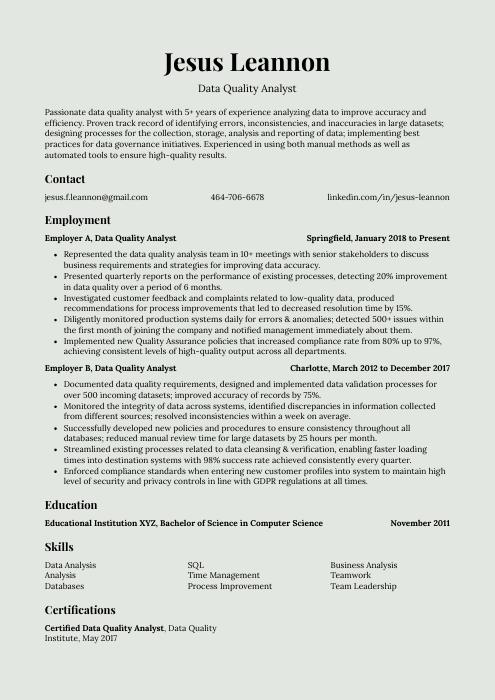 Saola
Saola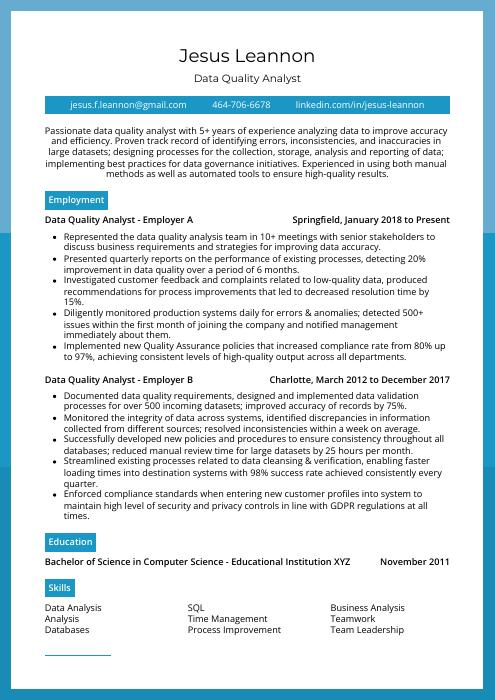 Rhea
Rhea Indri
Indri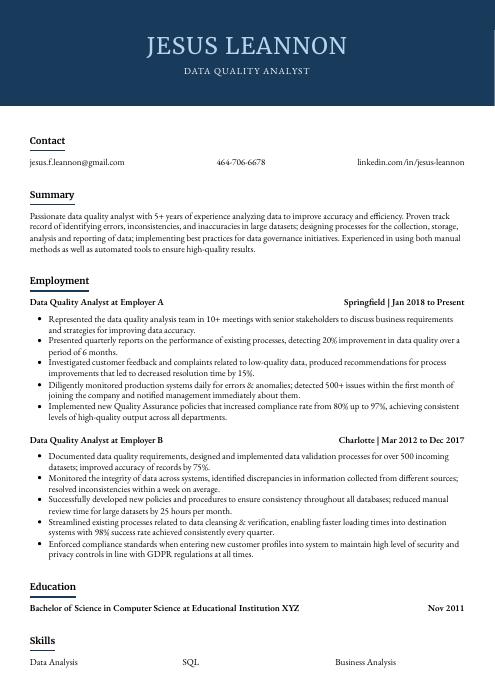 Bonobo
Bonobo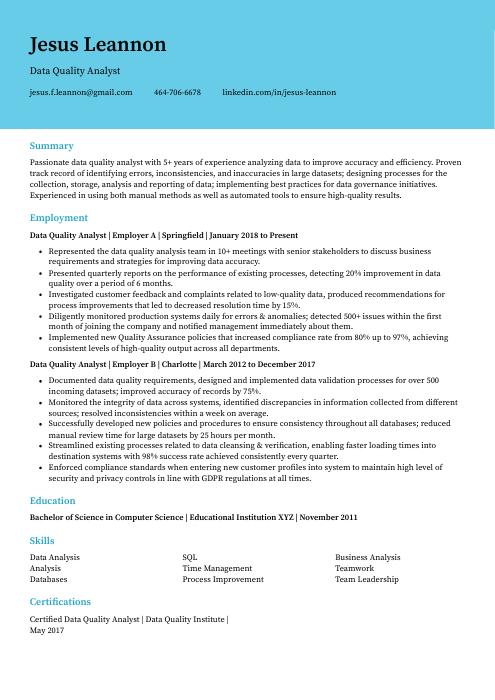 Dugong
Dugong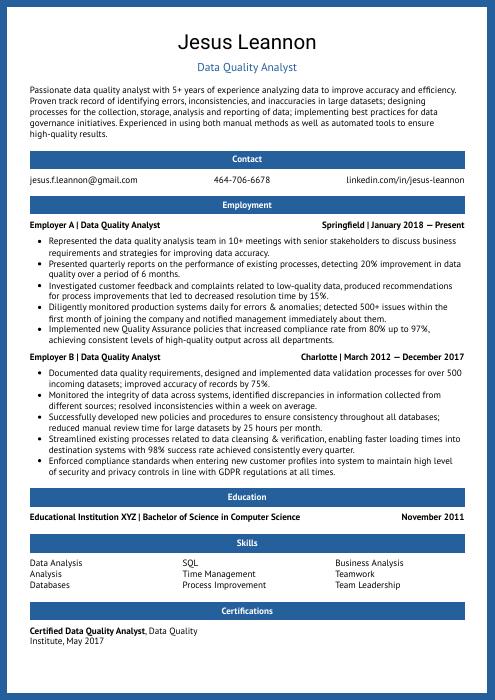 Ocelot
Ocelot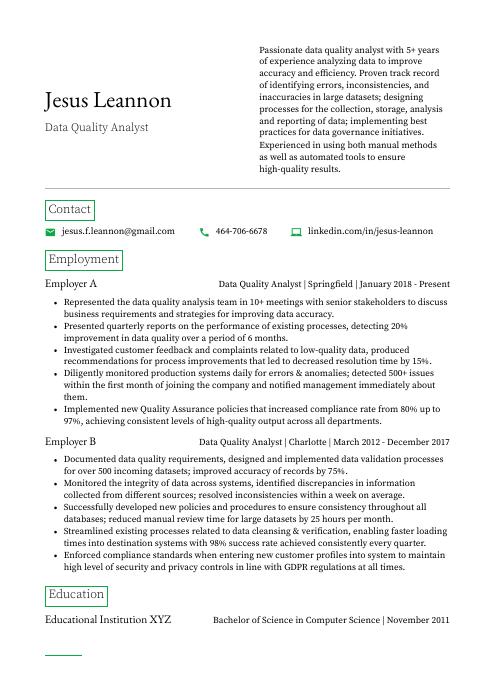 Quokka
Quokka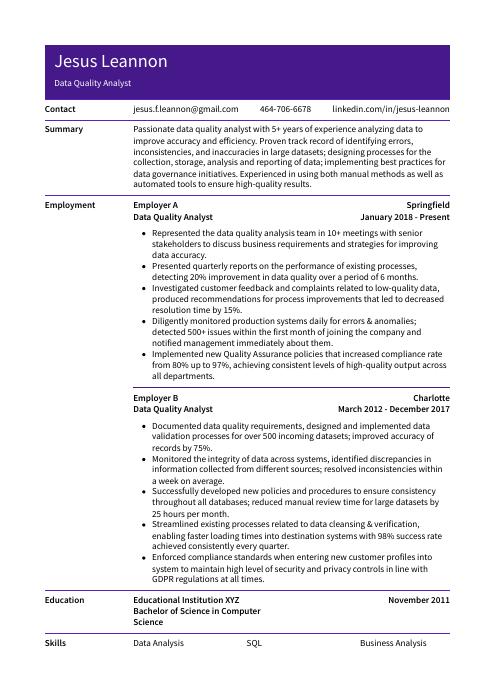 Pika
Pika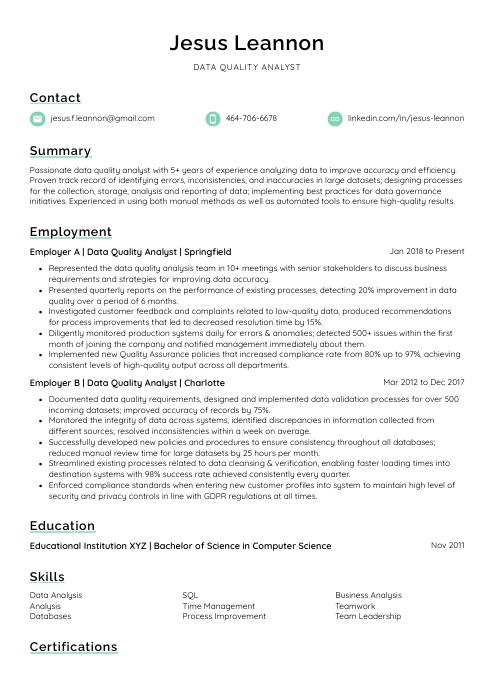 Lorikeet
Lorikeet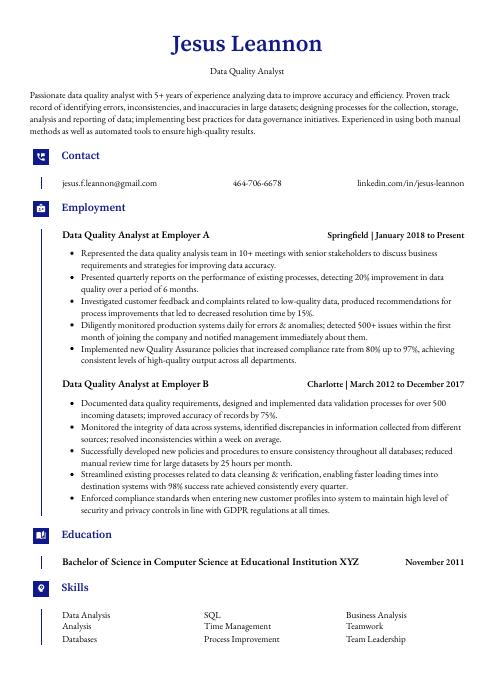 Gharial
Gharial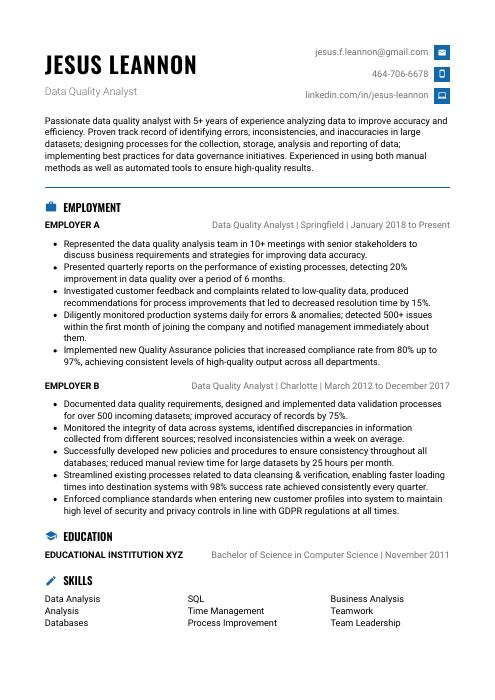 Echidna
Echidna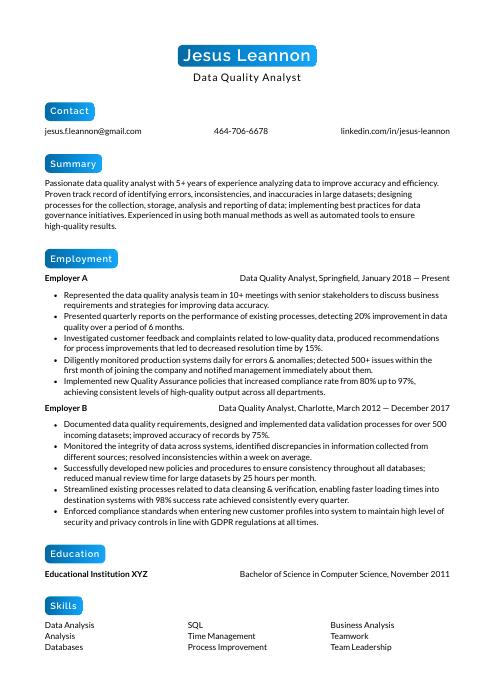 Kinkajou
Kinkajou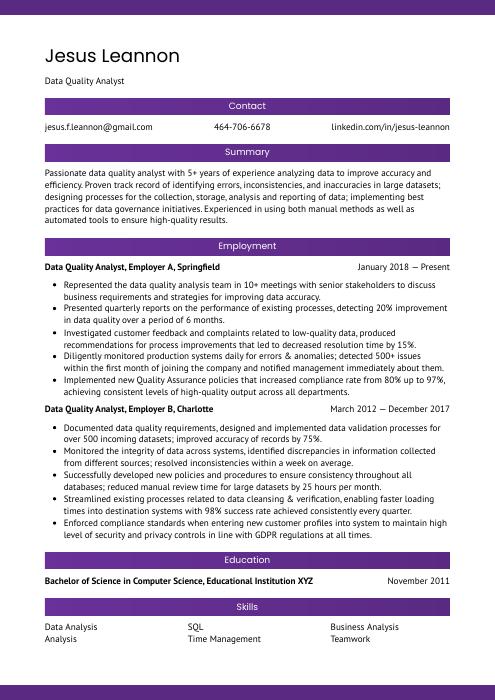 Jerboa
Jerboa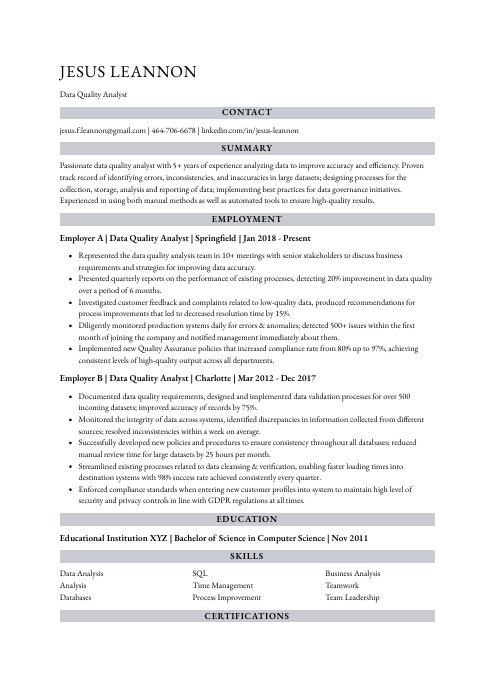 Numbat
Numbat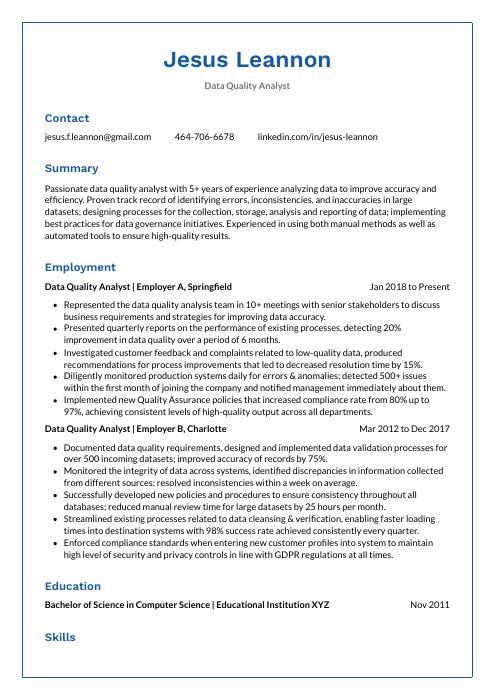 Markhor
Markhor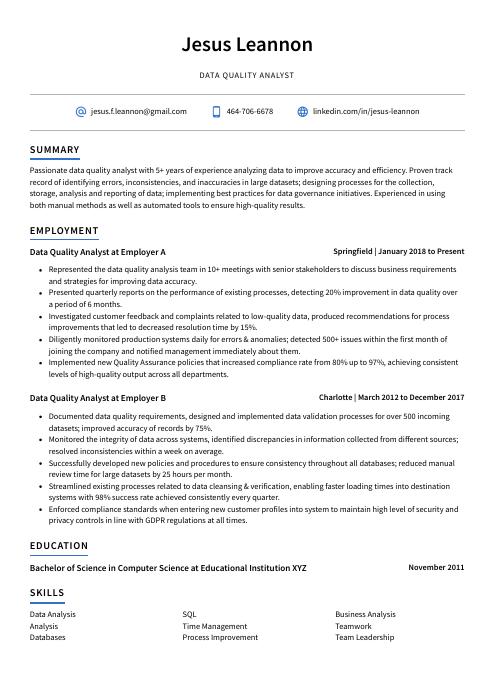 Axolotl
Axolotl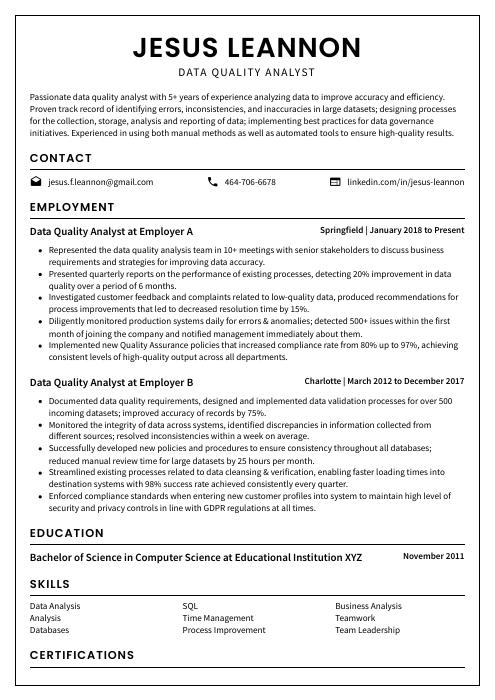 Cormorant
Cormorant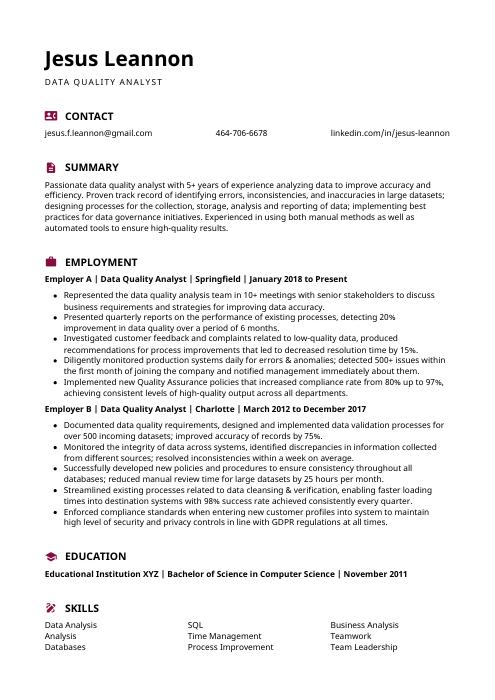 Hoopoe
Hoopoe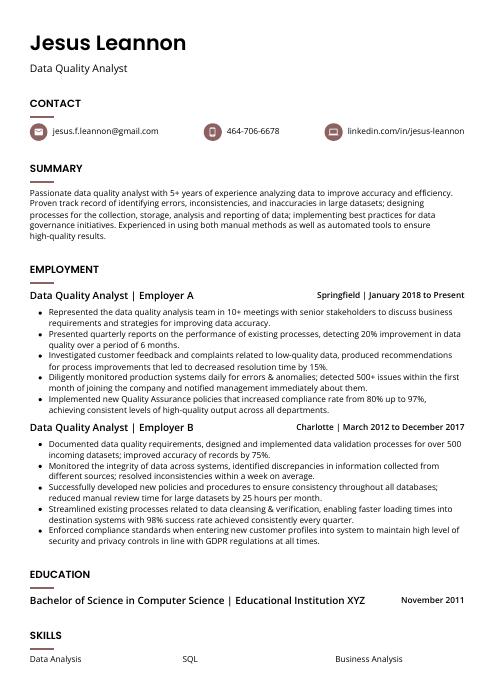 Fossa
Fossa Rezjumei
Rezjumei
